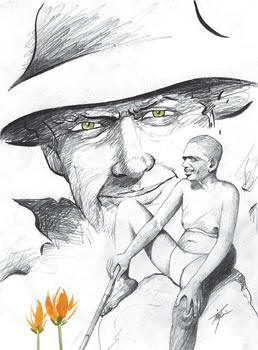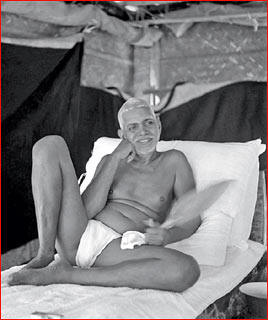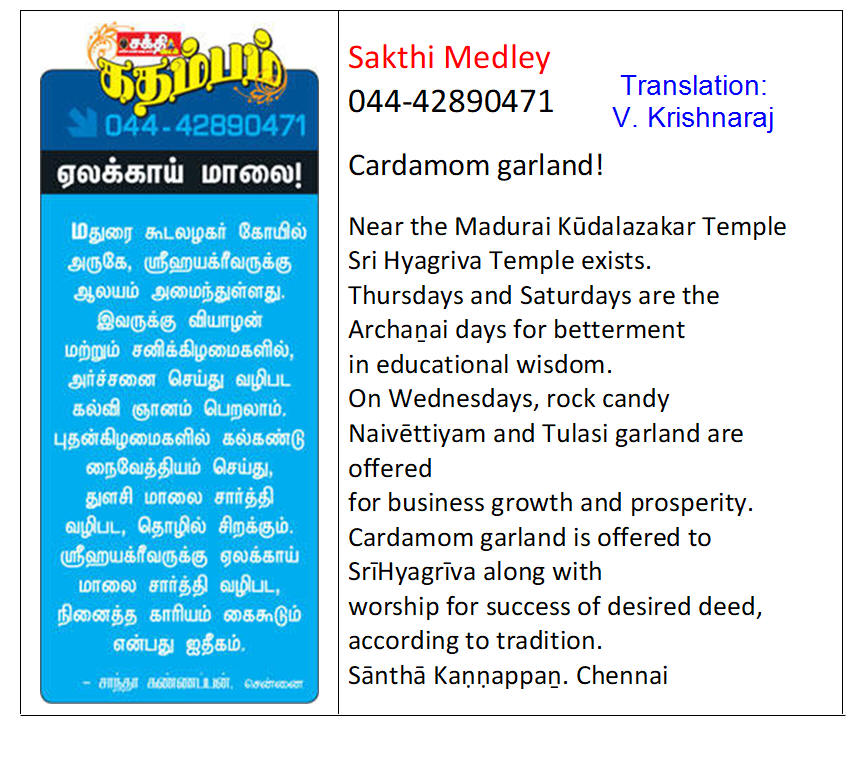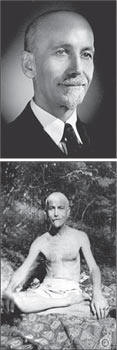Sakthivikatan Jan 12 2012
 Great
wonder envelopes, as I cogitate about Brunton. He lived somewhere in
Europe and explored the nations depicted in the line drawings of the
geographic maps.
Kanchi Mahāperiyava gave his blessings to the publisher and the world
traveler Paul Brunton in search of spirituality, and directed him to
Bhagavan Srīramaṇar as the most suitable spiritual guide for him.
Great
wonder envelopes, as I cogitate about Brunton. He lived somewhere in
Europe and explored the nations depicted in the line drawings of the
geographic maps.
Kanchi Mahāperiyava gave his blessings to the publisher and the world
traveler Paul Brunton in search of spirituality, and directed him to
Bhagavan Srīramaṇar as the most suitable spiritual guide for him.
Paul Brunton had many questions and found everything beguiling. He felt
the pervasion of peace and tranquility in him. With passing time, his
thoughts were backtracking to thought-void. He realized he was sitting
there experiencing ease and comfort. ‘What is this? There are no
thoughts in my mind. The mind that wanders in all directions, abandoned
its own nature and remained like a still snake under the control of
snake charmer’s pipe. My mind is tranquil. I never had this tranquil
moment before in my life. Paul Brunton realized, it happened because of
Bhagavan.
He said, “Food is unimportant now. Maharishi! I must know Truth. For
that only, I have made the visit. The scientist in the west never told
us the life’s truths. They did not reveal the hidden truths. People are
after creature comforts, burdened with greed and loss of peace and
tranquility. That is my observation. Though I spoke with a multitude of
people, I never received a satisfactory answer. I must know what Truth
is. For that I am here seeking you.”
A little while later, Bhagavan Srīramaṇar said, ‘You keep
saying “I,” “I.” What is
that “I.” Do you know who that “I” is?”
Bhagavan: “When you say ”I,” don’t you refer to your body?
Do you know that matter inside your body?
How do you discover it?
Brunton: “You have to teach me that. What do I do to discover it? You
should explain it to me.”
Bhagavan: “Perceive what your mind does, without interruption. By your
deep analysis (meditation), you will find the answer.”
Brunton: “I do meditations but do not see any progress.”
Bhagavan: “How do you know you have not made any progress?
In spiritual life, progress is hard to discern.”

Brunton asks a simple question, “How is my future?”
Bhagavan: “When you are unable to know your present, what is the use of
knowing what your future is going to be? Pay attention to the present.”
Brunton: “There are many problems around the world. In the future, would
people be friendly to each other?
Or will the world drown in war?
Brunton: “Maharishi, I look around. It is rare to see God’s mercy.”
Bhagavan: “Not knowing who you are, what merit do you gain by knowing
about the world? Not only that, why are you wasting your power by
getting involved in worldly matters? You must know yourself. Then,
clarity and perspective about the world will certainly come to you.”
Brunton: “If one is to know the truth or to know himself, he should sit
down in the forest all alone and perform austerities as said by Yogis.”
Bhagavan: “It is not necessary.
It is enough to meditate for an hour or two with closed eyes.
That meditation will help you clarify your other matters. That is, all
the work can be done by remaining in meditation. Meditation will become
your life and living for the whole day. The feeling associated with
meditation will rise to help you with other works.
Brunton: “You talk about Ātmā. You say, ‘go search for Ātmā.’ Are there
two
Ātmās:
the knowable Ātma and knowing Ātma?
Bhagavan: How could there be two
Ātmās?
You don’t apprehend who you are in truth. You imagine yourself to
be many things. You regard yourself as a body, Buddhi, and the doer of
this and that. The realization who you are is in truth concealed from
you. You who is beyond this concealment
⸺that
is discarding all the fabrications of the mind one by one, see yourself
and the truth is apprehended. After that, from the mind, an important
matter will come to the forefront. That will take control of you
completely. That controller is what behind the mind.
That is undivided, inspiring and permanent.
Some religions call this Heaven’s Empire. Another religion calls
it ‘Āṉmā.’
Some call it ‘Nirvana.’ Hindus, that we are, call it ‘Mukti.’ Mukti =
Liberation. Whatever
is the name, Satyam (Truth) is one. That which is behind you: what is it? What
are your fabrications. Abandoning all the fabrications, and asking,
‘What, What, What,’ that rises and takes hold of you. In this condition,
you do not lose yourself. Contrarily, you find out who you are with
clarity.
In this world, the kings and politicians desire to reign something. How
can someone who cannot rule himself, can rule others.
Did you get an answer to the puzzle, ‘What is God?’ If you know
it not, what else is known.
Brunton: Is it easy for the westerner to search?
Bhagavan: “This is an easy path for all, Indians, Westerners… with no
demarcation. You think it is hard; but it is easier than you thought.
The hurdle is to think that you can’t do it.
Pessimism is the impediment. You must understand, once you have
can-do attitude, you will make life prosperous. What else is there? It
must be done. It must be done by everyone.”
Paul Brunton sat before Bhagavan with no questions. Bhagavan
concentrates his sight on Paul Brunton. Paul loses his
self-consciousness and feels he is all-pervasive. Later he finds relief
from that feeling and comes back to his self. The mind is at peace.
The mind with no questions, with no desire, with no agitation remained
wilted, drooped and silent.
Brunton with opposed palms addressed Bhagavan, “Would you accept me as
your disciple?”
Bhagavan: “What is Guru-disciple paradigm? The differences are in
disciple’s perception. Once you discover Āṉma,
there is no Guru and there is no disciple. He (God) sees all with an
equal eye. He sees with non-difference.”
Brunton: When I retire to the forest, there is no one to distract my
attention. Is it not true? Living in the city poses many mental
distractions.”
Bhagavan: “Once you attain your perceived goal and realize the real you
inside, it is the same whether you live in the forest or the country.”
Brunton: “You talk of lofty things. But, Indians have not advanced.”
Bhagavan: “Yes. What you say is true. We are backward classes. Because
of that, do not think we are not happy. Our needs are minimal. Are
Europeans with higher needs and more clothes happy? Where there is no
happiness, there is no gain either with increased or with diminished
needs. What kind of calculation is that? Are not needs for happiness?
When happiness does not prevail and the mind is not tranquil, what is
the meaning of needs and gains?”
Brunton after his arrival in London wrote a book “A Search in Secret
India.” Though he wrote many books, the accolades he received from this
book remains enduring. Paul Brunton celebrates Maharishi very much.
Without the pretense of scientific or acquired book knowledge of
Tattvas, Maharishi explains his experiential truths from direct
perception in an easy to understand and easy to follow manner.
By his sight, by his presence and by his subtle power, he brings
tranquility, peace and focus to the wandering mind.
He shows the path to all. Bhagavan is not a mere explicator. He does not
stop with just a speech. He has the power and persuasion to drive home
his message and tenets with ease. Bhagavan’s path is not the harsh Yoga
Mārga but is the Bakthi and Jnana. Just as the Muslim turns his face to
Mecca from wherever he is, my mind turns to Tiruvannamalai. It is the
sacred Margās
place in my psyche. Remaining at the feet of Bhagavan, lighting up the
spiritual flame, and taking it to the West, I gave it to the spiritually
parched souls. They received the light with earnestness. I should not
pride myself because of this good deed. This spiritual flame, received
by the Western Sādhakas
was lighted by Bhagavan; and in truth I am simply the messenger and the
bearer of the torch.
Paul Brunton was the driving force behind Sādhakas from many foreign
countries paying homage to the mountain, Ramanar and other Jñānis.
Jñānam is not the exclusive property of one nation, one religion, and
one path. Man, in pursuit of Jñānam is at it constantly. Tiruvannamalai
is the refuge for the seekers. Ramanasramam is a great fane.
Paul Brunton’s book has many rare titbids in its pages. He described
Tiruvannamalai beautifully from the perspective an Englishman. Forty
years later, he came to Tiruvannamalai and paid homage to the
SriRamanar’s Samādhi.
Many events were forgotten in forty years. He confides, “The memory of
Srīramaṇar is in me as fresh as ever.”
Paul Brunton adds, “Bhagavan’s Darśan is still an event even today.”



